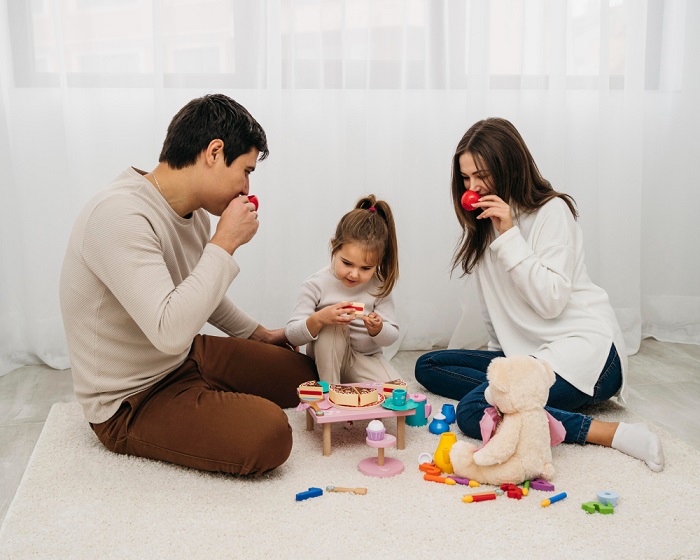The single biggest truth about toddlers is that they are temperamental creatures. Their tastes, opinions, likes, dislikes, and preferences may change daily, if not hourly. This is stressful for parents in and of itself—for example, a previously enjoyed meal or snack is now your child’s number one enemy and, of course, this usually happens after you’ve bought a ton of that thing you thought they loved.
Sound familiar?
As frustrating as that is, it is a very typical part of the normal toddler experience, and I wouldn’t expect anything less. They have to keep you on your toes, after all! But that’s a relatively innocuous (albeit annoying) experience compared to other nuances of toddler temperament.
In particular, another completely normal part of toddlerhood is having a preference for one parent over the other. And that one is a much more sensitive experience that cuts way deeper than rejecting a previously enjoyed snack.
If you are not the currently preferred parent, I know you’ve already wondered in a panic whether your child simply doesn’t like you.
NO! I promise that’s not the case. Far, far from it, in fact. First and foremost, please remember this is not a rejection. Your child is not rejecting one parent in favor of the other, but there are some common reasons why a toddler may gravitate toward one parent and why those phases shift.
Three Important Reasons A Child May Have A Preferred Parent
1. One Parent is the Default Parent
The most common reason is that, typically, one parent is the default parent. In other words, one parent inevitably spends more time with a child and becomes the default for all wants and needs. Often, the preferred parent is the default parent. But you already knew that.
2. Your Child Craves Time with the Less Available Parent
Maybe what you’re experiencing is the opposite. Who knew that the non-default parent may become the preferred one!? The default parent’s presence is a given and, to some degree, taken for granted. And that’s more than okay. That’s an incredible comfort you’ve provided your child. It is exactly what your child needs from you. Your presence should be a given. You have worked very hard to build that level of security in this relationship, and you should be proud! From an attachment-based perspective, your child knows, without a shadow of a doubt, that you are their secure base from which they can explore their world and you are their safe haven to which they can always return without ever having to worry that you may not be there or accept them.
All of this is great, but it also means that the other parent’s presence is not always a given, usually due to work schedules. Time is such an unclear construct to a toddler’s brain that they truly have no grasp on when a parent will go to work, how long they’ll be gone, or when they’ll come back. So, when that parent is available, your child will choose them again and again. And probably never let them out of their sight, just to ensure their time together is maximized (certainly they can’t leave again if they’re being so closely watched!).
3. Parents’ Own Triggers
There are times when toddlers can sense a parent’s comfort or discomfort with specific parts of the parent-child relationship. Remember that secure base / safe haven thing I mentioned? Sometimes, we as parents are not comfortable with one or the other. You may feel so anxious and worried when your child goes out to explore the world that, in turn, they feel anxious about doing it with you. Or you may feel highly triggered by their big feelings when they need comfort whereas their other parent is unfazed. Kids learn early on who is comfortable vs. uncomfortable with which of their needs and will only seek out the parent who they feel can best handle those needs. If this hits close to home, Unpolished Parenthood can help.

How to Handle It When Your Toddler Prefers One Parent Over the Other
- Above all else, remember that it is not a rejection, and your child doesn’t love the favored parent more or the other parent any less. Don’t be concerned, you didn’t do anything wrong!
- Don’t show any emotional reactions to the preference. Don’t withdraw, shut down, or react with your own big feelings. Approach the situation completely neutrally.
- Allow for one-on-one time for each parent with each child. This is an extraordinarily special experience for kids. Then, join in. Without trying to change the play, insert yourself, match the mood, and follow their lead. You’ll find yourself transitioning from bystander to participant sooner than you think.
- Switch off on more of your child’s needs, even if they protest. For example, if one parent is always the one to do the bath, trade as often as possible. When kids protest, offer validation but hold the boundary. “I hear you, you want mommy to do a bath tonight. It’s daddy’s turn for a bath and I love spending this time with you!”
Each situation is unique, but each parent-child relationship can be enhanced to the fullest. If you need more support in this area, contact us today.
Dr. Ellen Kolomeyer is a clinical psychologist based in Plantation, FL, and provides traditional one-on-one therapy, personalized programs, and strategy sessions, aligned with enhancing child-to-parent relationships and child behavior support.
Call 305.619.3264 or message Unpolished Parenthood today.

